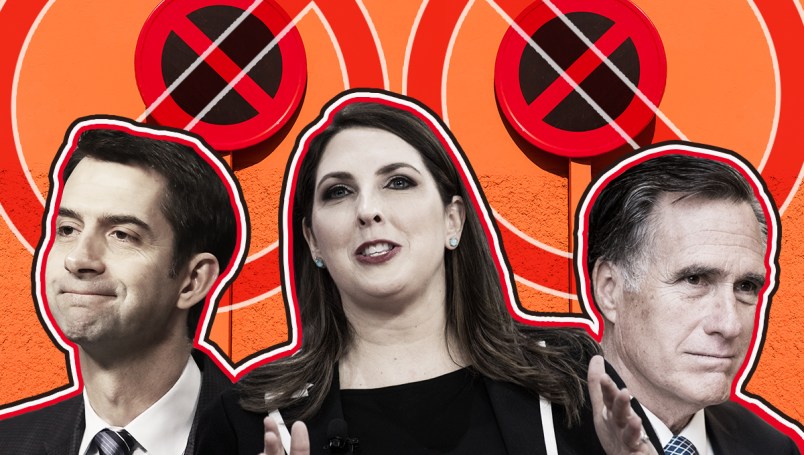After 25 white men in the Alabama state Senate approved a bill outlawing nearly all abortion in the state, which was subsequently signed into law with by Gov. Kay Ivey (R), some prominent Republicans have sought to distance themselves from the legislation, which is far to the right of where polling indicates most Americans stand on the issue.
But many of these Republicans now seeking political shelter sang a much tougher tune on outlawing abortion when the end of Roe v. Wade wasn’t such a real possibility.
Take Sen. Mitt Romney (R-UT) for example: In an interview Sunday, he said he didn’t support the Alabama law and called a separate bill in Missouri — a so-called “fetal heartbeat” bill that would ban abortion after eight weeks, with no exceptions for rape or incest — “extreme”
But in 2007, when he running for the GOP presidential nomination and eager to shed perception as a liberal Republican from Massachusetts, Romney took quite a different stance in a debate. Asked about the potential for a federal ban on all abortion should Roe v. Wade be overturned, Romney said that while unlikely, “it would be wonderful” if the national consensus allowed for such a bill in Congress.
“I would welcome a circumstance where there was such a consensus in this country that we said, we don’t want to have abortion in this country at all, period,” he said. Pressed by CNN’s Anderson Cooper, Romney added: “I’d be delighted to sign that bill.” Then again, Romney has taken multiple public stances on abortion over his political career.
Romney’s niece, Ronna McDaniel, the chairwoman of the Republican National Committee, said Friday that, “personally, I would have the exceptions” for legal abortions in cases of rape and incest — not present in the Alabama bill — in addition to cases in which a pregnant woman’s life is in danger.
But just five years ago, when she was campaigning to become the Michigan GOP’s representative on the Republican National Committee, McDaniel responded to a written questionnaire from the group “Grassroots in Michigan,” which asked what exceptions she would want, if any, in anti-abortion laws.
“Exception for Life of the mother,” she responded, making no mention of exceptions for rape or incest. A year later, she became chairwoman of the Michigan Republican Party. A year after that, she took over leadership of the Republican National Committee.
After she was elected RNC chair, the anti-abortion site LifeNews.com reported in an article this past January that McDaniel claimed she would not change the Republican platform on abortion, which makes no mention of exceptions for rape or incest.
The GOP platform does endorse a federal version of an abortion ban after 20 weeks, the “Pain-Capable Unborn Child Protection Act,” which makes certain exceptions for rape, incest and the lives of pregnant women. But the same platform also calls for “a human life amendment to the Constitution and legislation to make clear that the Fourteenth Amendment’s protections apply to children before birth.”
Sen. Tom Cotton (R-AR) markets himself as part of the Senate’s far right, so it was notable when he implied in an interview Sunday that he accepted that states should be able to craft individual abortion legislation, even if the laws are more pro-choice than he’d like.
“Meet the Press” host Chuck Todd noted that Cotton personally believes that “life does begin at conception.” How then, Todd asked, “do you justify an exception for rape and incest?”
Because, Cotton answered, “we live in a democratic society. I recognize not everyone shares my views or the views of the vast majority of Americans or of Arkansans.” Pointing to New York and Virginia, he said that “states are going to make different decisions.”
Setting aside that most Americans don’t agree, even in a recent poll touted by anti-abortion outlets, that “life” begins when a sperm meets egg, Cotton’s own record contradicts his comment Sunday that states should have the ability to craft their own abortion access laws.
As Todd pointed out Sunday, in 2014 Cotton became a cosponsor in 2014 of the “Life at Conception Act,” which declared that “each born and preborn human person,” beginning at fertilization, should have 14th Amendment protections.
And in 2012, when he was running for Congress, Cotton also said he supported the Unborn Victims of Violence Act of 2004, which makes it a crime to injure or kill a fetus in the course of other violent offenses. Though the law’s last page makes an exception for abortion, it defines an “unborn child” as “a member of the species homo sapiens, at any stage of development, who is carried in the womb.”
In fact, Cotton at the time portrayed his support for the law as indicative of his support for nationwide anti-abortion laws.
“We must re-establish a culture of life in America that reflects the value of every life from conception through birth, life, and death,” his 2012 House campaign website said, according to OnTheIssues. “I am pro-life and I will always vote that way in Congress. I believe Roe v. Wade and Planned Parenthood v. Casey were wrongly decided. I oppose taxpayer funding of abortion. I also support measures like the Partial-Birth Abortion Ban Act, the Unborn Victims of Violence Act, and the Ultrasound Informed Consent Act.”



